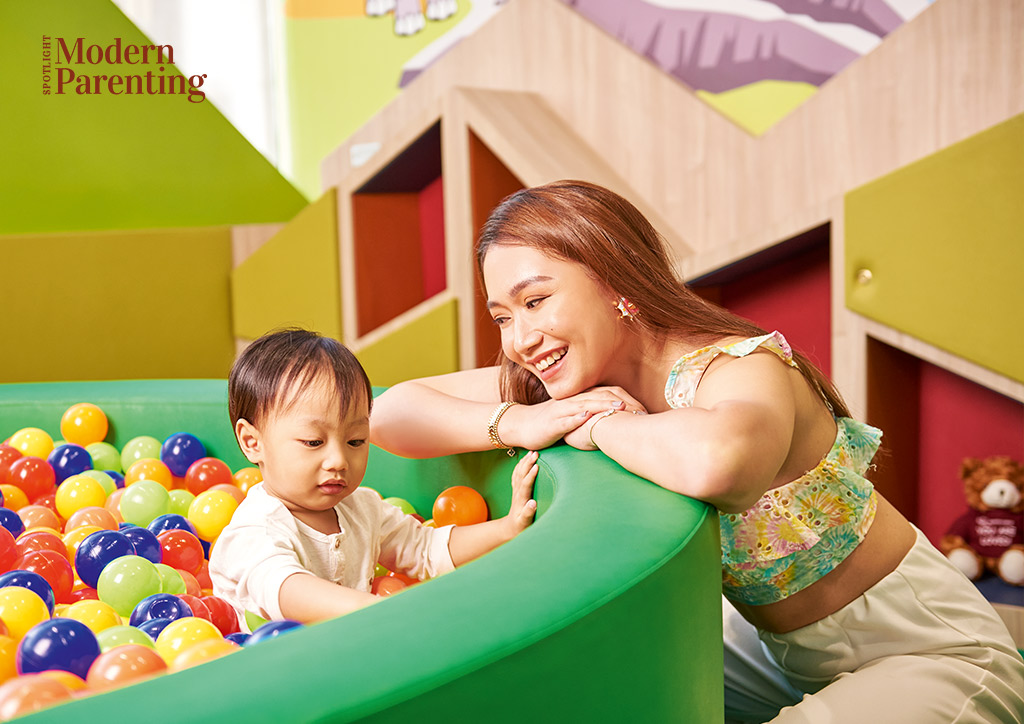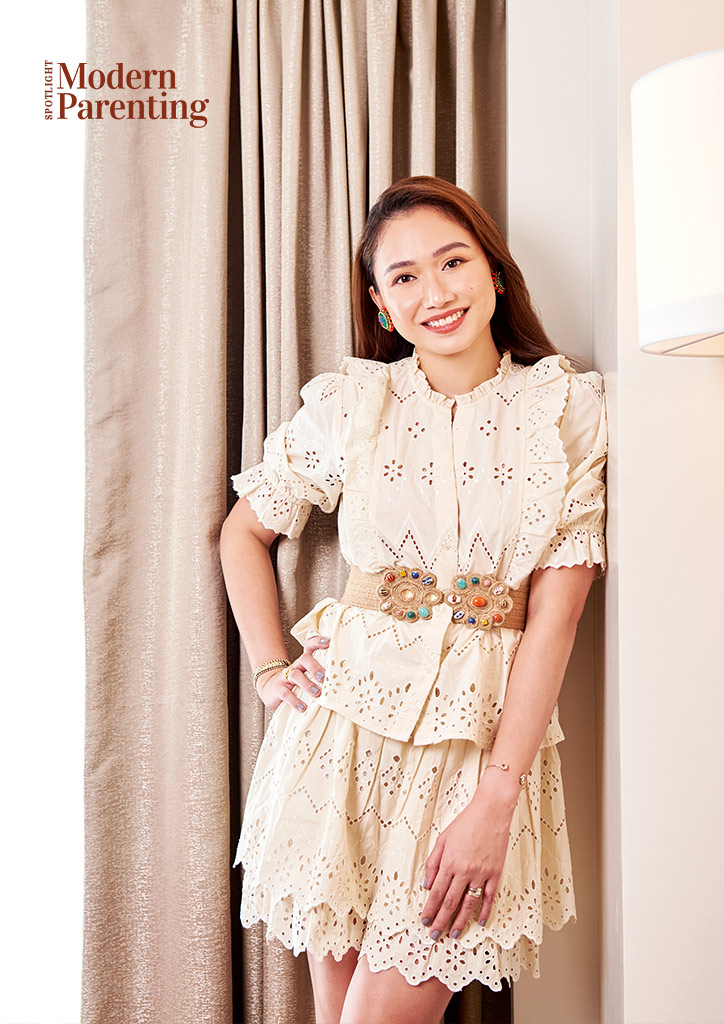Spotlight
Cha Cruz Behag Talks About Normalizing Miscarriage Conversations and the Parenting Lessons She’s Learned
Cha Cruz Behag opens up for the first time about her recent miscarriage, and how experiencing it doesn’t make you less of a woman or mom.

It’s easy to see why Cha Cruz Behag has gained such a loyal following. More than being a star on the volleyball court, her authenticity and kindness just radiate. We met for the first time through a video call yet she talked as if we had known each other for years. There was no trace of pretense—she was so down-to-earth and honest about the struggles she recently faced. On top of that, seeing how she interacted with her husband Ray and son Sol, who were both present during our interview, was refreshing to witness.
Raising their Sunshine
Sol means ‘sun’ in Spanish and is the God of Sun in Roman mythology. As the sole sunshine in their lives, Cha and Ray beam whenever they talk about their son. Being hands-on with him definitely has its benefits because at two years old, he’s independent and well-disciplined. In fact, despite having no help nor yaya, Sol was so well-behaved during our photoshoot with Cha. And it’s all attributed to the teamwork of his parents.

When asked if being an athlete has helped her with motherhood, Cha responds, “Of course! Being a student-athlete, you learn a lot about time management. After being a student-athlete, I became a working athlete. I learned to multi-task. And the discipline part, you really need to have it—because it’s so hard. Breastfeeding alone takes up so much. But another thing I learned in being an athlete and being part of a sports team is teamwork.”
Being the captain of her team has taught Cha how to be motherly as well. She admits to always looking out for her teammates and being a big sister to them.
The Possibility of a Comeback
Envisioning a comeback isn’t difficult for Cha Cruz Behag. “Professional volleyball players, especially international players, even after they give birth, they go back to playing right away. Some aren’t even in their early 30s. There are some who are in their late 30s. But for me, I really want to have my knee checked first. Just so I can say I’m cleared to play. And it would be ideal for me to play without the bubble—so I can go home to Sol and Ray every day. Hopefully soon!”

“I’ll be leaving for the US to have my knee checked by a doctor there and see what the next step is. And then from there, hopefully by early next year, I can go back to working out daily and having my routine.”
Despite the thought of playing again, another priority Cha has is becoming a mom to more kids. “We really want four kids. But we’re going to trust the Lord when it comes to that. Actually, to be honest, one of the reasons I also didn’t push through with volleyball this pandemic is because we have been trying for a second baby. Last August, we tried and we got a positive result. But then I experienced bleeding and was put under bed rest and all. By the second week of September, we had a complete miscarriage.”
Cha Cruz Behag on Normalizing Conversations About Miscarriage
It was at this point that our video interview turned quite emotional as Cha opened up for the first time about her recent miscarriage. And as women who have both experienced it, we were able to relate with each other.
“We were so excited about it!” Cha started. “Because with Sol, during the first or second try, we got pregnant right away. So we tried again for the first time after Sol, and we got a positive result. We were so excited! But I got scared because I suddenly experienced spotting, and that never happened to me with Sol. A lot of OBs say it happens, and even my sister said that it also happened to her in her second pregnancy. Spotting is somehow normal, so you just need to drink your medicine, rest, and follow your OB.”

Grieving is part of the process
“It was really hard,” Cha admits. “It really had an effect on me. At some point, I grieved. There were so many realizations that Ray and I both learned. It’s still hard for me to talk about it actually. But I think the grieving part is so important because you need it. Grieve for as long as it takes. It’s important to reflect and pray as well. The Lord will help you get through it. And you will realize that yes, I’m going to trust in His plan. This is the best plan for me at the moment.”
Cha opened up about Ray being there as her support as well. “It really helps to have a partner support you. I’m not used to not having anything to do in the house. So when I was on bed rest, Ray was there the whole time.”
Ray, who was a former football player and currently a pilot, took over running the household and taking care of Sol. “I didn’t have to deal with the stress of that. He was really there for me emotionally and prayed for me all the time. He kept reminding me that God is good,” Cha said. “I remember feeling so pacified.”

It doesn’t make you less of a man or woman
The couple added that their OB kept reminding them there was nothing they did wrong. “She said there was nothing we could have done to make it a good pregnancy. Because people often think that there was something wrong with the egg or the sperm. Wives would think, ‘I’m not a good woman,’ or husbands would think, ‘I’m not a good husband.’ We learned that experiencing this doesn’t make us less of a woman or a man, or less of a wife or a husband.”
“There will be people who will try to downplay your experience. They’ll say things like, ‘Ah, buti na lang hindi pa umabot sa ganitong stage. (Oh, good thing it hasn’t reached this stage yet). Maybe that’s what they feel would comfort us.”
“When we experienced the miscarriage, it taught us how to empathize with people who also went through it. It’s just like COVID. If you don’t experience a friend or a family member that actually suffered from it, COVID will just be a number every day. Like okay, 900 cases, 1,000 cases, 10,000 deaths. For you, it will just be a number. But if you actually go through it, you know that each number, each person actually has gone through it. And if you get to talk to those people, you won’t just be like, ‘It’s okay.’ It’s going to be like, ‘I’m here for you. We’re going through this journey with you. We went through something similar.’ It’s easier when you’re going through it with other people.”

Helping others by sharing their story
“Our baby was just 5 or 6 weeks old. Some lose their babies maybe later on and people will say, ‘Oh, good thing it was at that young stage.’ But for a parent, the moment you find out you’re having a baby, you already have dreams and aspirations for that baby. So when people say, ‘Good thing he or she didn’t reach 18 years old because it’s harder,’ for us, he or she already reached that. In our dreams, he or she is already a person. That’s what people who didn’t go through what we went through won’t really understand. And in our culture, we don’t normally talk about these things. We have to open our minds to these types of conversations.”
With her head held high, Cha Cruz Behag says that the miscarriage was God’s way of using them to help other people. “We can normalize this; normalize talking about this. It’s okay not to feel okay. It’s okay to let people know we’ve gone through this. Because personally, when I went through this, it made me stronger. When I went through it, I found out that I had super close friends who experienced it as well. And we were able to openly share it with each other. The grief will only last for a time. But after that, you will be motivated to continue and still try.”
Parenting Lessons from the Pandemic
Like most of us, the pandemic heavily affected Ray and Cha. “It was really a struggle. When I became a full-time mom, I had to rely on Ray financially. But then there were no flights for Ray, so it was hard. If there’s one thing we’re really faithful about, it’s our tithes. We would still give to the Church, and it would come back out of nowhere.”

Living under their means
“This pandemic really taught us what’s essential and what’s not. We stopped spending on extra shopping. We learned to live not just within but under our means.”
When it came to parenting, the couple shared the greatest parenting lessons brought about by the pandemic. “Just focus on what really matters,” Cha Cruz Behag shared. “This pandemic really taught us how to be emotionally mature. As husband and wife, we grew into having a deeper faith. Every week, we’d have bible study with friends and family. Relationships and family are really important. We need to invest our time with kids because that’s what’s going to give the right foundation and values in life. If you really instill in them having that genuine love for the Lord, it’s going to fuel them far.”

Adapting and learning
Another thing the pandemic taught the couple is learning how to adapt. “Right now, we’re parenting a 2-year-old. But since we want more kids in the future, and as they grow older, the difficulties and challenges will be exponentially more. So we will continue to adapt and learn. We can’t be rigid and just follow tradition. It’s constantly adapting, learning, listening, and observing. It’s going to get more interesting!”
Words GRETCHEN GATAN FRAGADA
Photography KIERAN PUNAY
Styling SIYA DARYANI and ROSHNI MIRPURI for CLOSET CULTURE
Makeup TAMARA PINEDA for NARS PH
Hairstyling VEN ANDOT for CREATIONS BY LOURD RAMOS
Sittings Editor MARGA MEDRANO TUPAZ
Special thanks to SOMERSET CENTRAL SALCEDO MAKATI, EUNA LODRIPAS, AND MISS SUSAN SALCEDO
Read more Spotlight Stories right here on Modern Parenting:
Dara David Roa Shares Her Joy Being Cozy in Nature
Christiana Collings-Canlas on the Simple Things During Life in Lockdown
Kryz Uy-Young and Slater Young’s Vlog-worthy Life, Revealed





